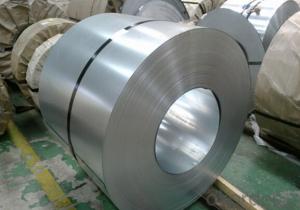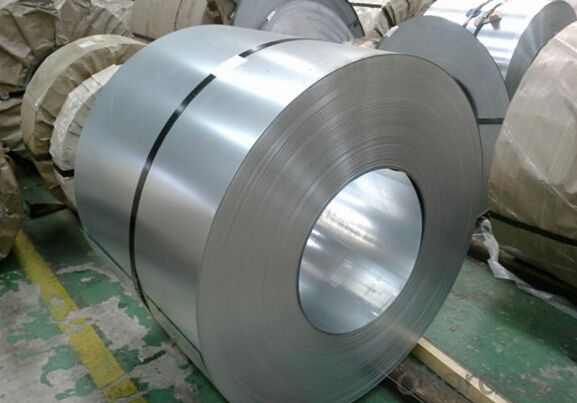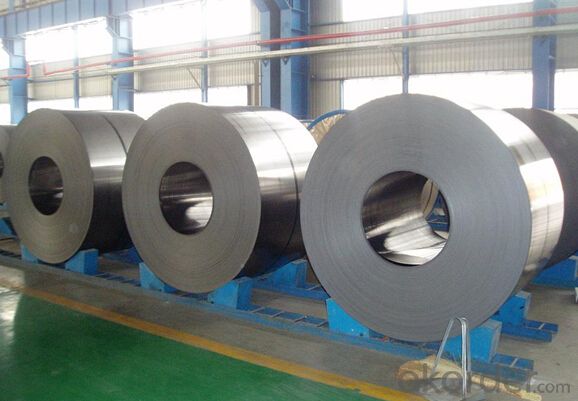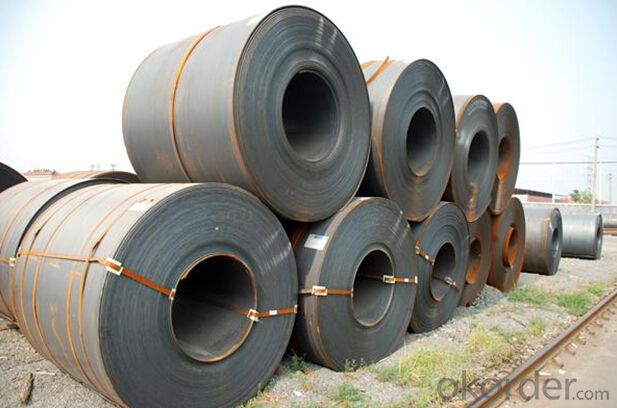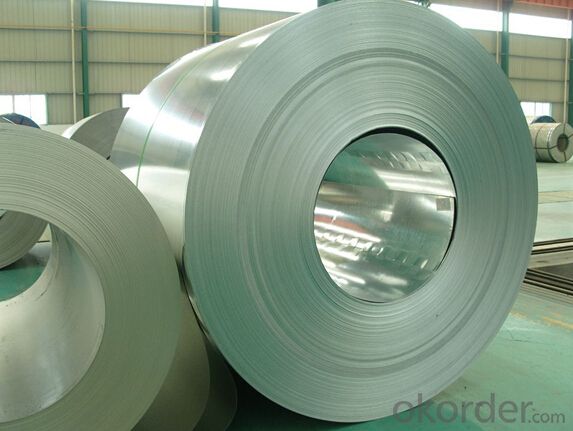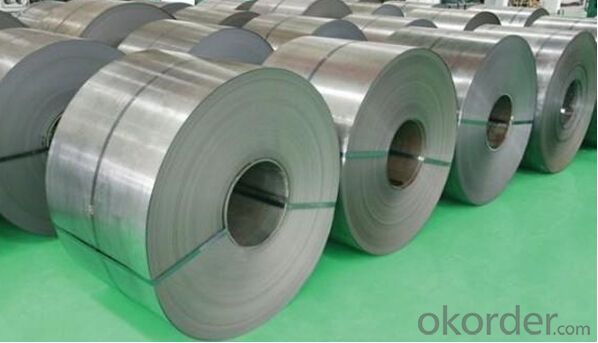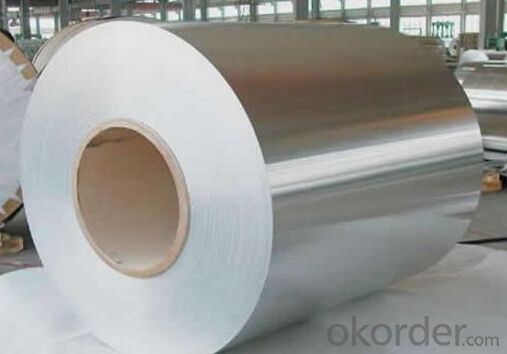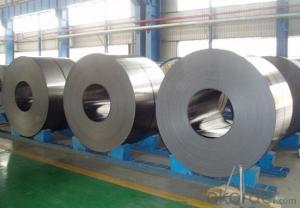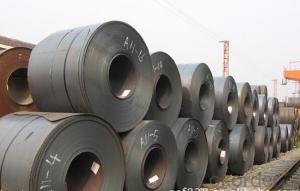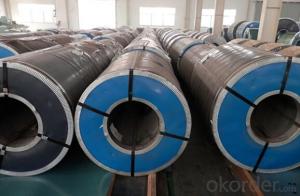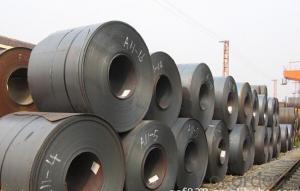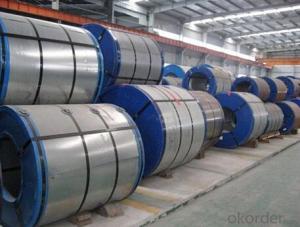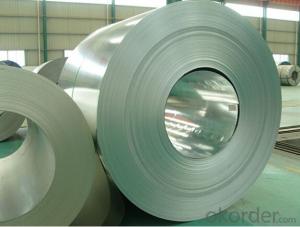Grade EN10130-DC01 Galvanized Steel Coil
- Loading Port:
- Tianjin
- Payment Terms:
- TT OR LC
- Min Order Qty:
- 3 m.t.
- Supply Capability:
- 10000 m.t./month
OKorder Service Pledge
OKorder Financial Service
You Might Also Like
Specification
Grade EN10130-DC01 Galvanized Steel Coil
Specification of Grade EN10130-DC01 Galvanized Steel Coil
1. Galvanized Steel Coil
(1) Width: 600-1570mm
(2) Thickness: 0.13-5.0mm
(3) Grade: JIS G3302-SGCC-SGC570, SGCH (full hard-G550), SGHC-SGH540
EN10346-DX51D+Z, DX53D+Z, S250GD-S550GD
ASTM A653-CS-B, SS255-SS550
(4) Zinc Coating: Z40g/m2~Z500g/m2 (both side total coating thickness)
2. Galvalume Steel Coil
(1) Width: 600~1500mm
(2) Thickness: 0.15~2.30mm
(3) Grade: JIS G3321-SGLCC, SGLC400-570, (G550)
EN10346-DX51D+AZ, DX53D+AZ, S250-S550
ASTM A792M CS-B, SS255-SS550
(4) AZ Coating: AZ50~AZ185g/m2
3. Prepainted Galvanized Steel Coil (PPGI)
(1) Width: 600~1250mm
(2) Thickness: 0.19~1.50mm
(3) Grade: JIS G3312-CGCC, CGC340-570, (G550)
ASTM A755M CS-B, SS255-SS550
(4) Zinc Coating: Z40g/m2~Z500g/m2 (both side total coating thickness)
4. Prepainted Galvanized Steel Coil (PPGL)
(1) Width: 600~1250mm
(2) Thickness: 0.20~1.50mm
(3) Grade: JIS G3322-CGLCC, CGLC340-570, (G550)
ASTM A755M CS-B, SS255-SS550
(4) AZ Coating: AZ50~AZ185g/m2 (both side total coating thickness)
5. Cold Rolled Steel Coil (Soft) (for further information, pls click the product name)
(1) Width: 600~1570mm
(2) Thickness: 0.13~2.50mm
(3) Grade: JIS G3141-SPCC-SD, SPCD-SD, SPEC-SD
JIS G3135-SPFC 340/390/440
EN10130-DC01, DC03, DC04
SAE1006, SAE1008
ASTM A424-TypeⅡ
6. Cold Rolled Steel Coil (Full Hard) (for further information, pls click the product name)
(1) Width: 600~1570mm
(2) Thickness: 0.13~2.50mm
(3) Grade: JIS G3141-SPCC-1B, SPCC-1D
7. Hot Rolled Steel Coil
(1) Width: 1000~1524mm
(2) Thickness: 1.20~16.5mm, other thickness can be negotiation
(3) Grade: JIS G3101-SS400, JIS G3132-SPHT1/2/3, ASTM A36, Q195, Q235 etc.
Company Introduction of the Grade EN10130-DC01 Galvanized Steel Coil
CNBM International Corporation is the most import and export platform of CNBM group(China National Building Material Group Corporation) ,which is a state-owned enterprise, ranked in 270th of Fortune Global 500 in 2015.
With its advantages, CNBM International are mainly concentrate on Cement, Glass, Iron and Steel, Ceramics industries and devotes herself for supplying high quality series of refractories as well as technical consultancies and logistics solution.
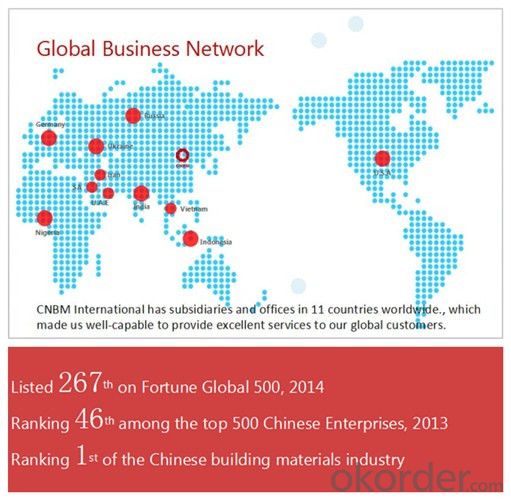
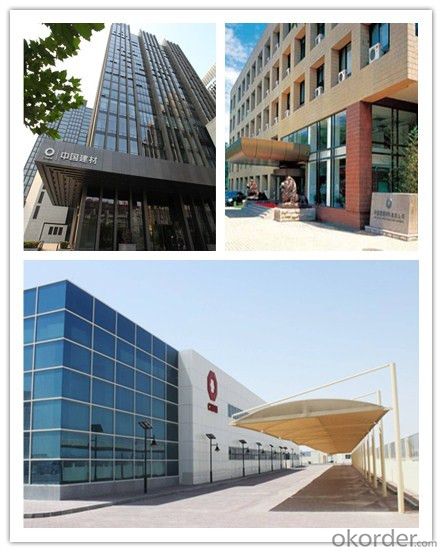
Packaging & Delivery of the Grade EN10130-DC01 Galvanized Steel Coil
Packaging Detail | Sea worthy packing /as per customer's packing instruction |
Delivery Detail | 15 ~ 40 days after receiving the deposit |
Products Show:
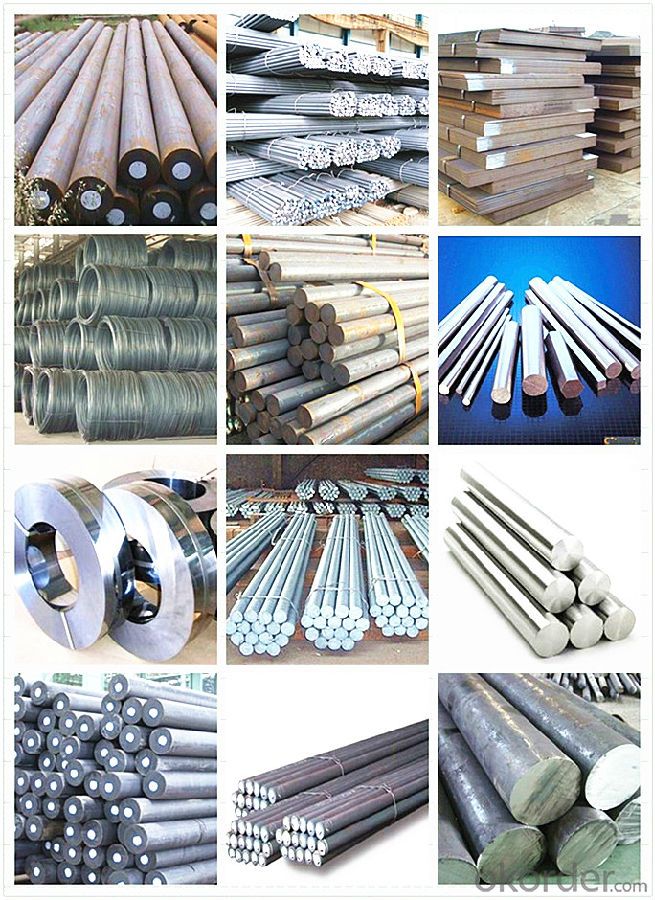
FAQ:
Are you a trading company or manufacturer? | Manufacturer |
What’s the MOQ? | 3 metric ton |
What’s your delivery time? | 15-35 days after downpayment received |
Do you Accept OEM service? | Yes |
what’s your delivery terms? | FOB/CFR/CIF |
What's the Payment Terms? | 30% as deposit,70% before shipment by T/T |
Western Union acceptable for small amount. | |
L/C acceptable for large amount. | |
Scrow ,Paybal,Alipay are also ok | |
Why choose us? | Chose happens because of quality, then price, We can give you both. Additionally, we can also offer professional products inquiry, products knowledge train (for agents), smooth goods delivery, excellent customer solution proposals. |
What's your available port of Shipment? | Main Port, China |
What’s your featured services? | Our service formula: good quality+ good price+ good service=customer's trust
|
Where are your Market? | Covering more than 160 countries in the world |
- Q: What are the different surface finishing methods used for special steel?
- There are several surface finishing methods used for special steel, each serving a specific purpose and achieving different results. Some of the common surface finishing methods for special steel include: 1. Grinding: Grinding is the process of using abrasive materials to remove excess material from the surface of the steel. It is typically used to achieve a smooth and polished finish, as well as to remove any imperfections or roughness. 2. Polishing: Polishing involves using polishing compounds and abrasive materials to create a smooth and shiny surface on the steel. This method is often used to enhance the aesthetic appeal of the steel and improve its corrosion resistance. 3. Shot blasting: Shot blasting is a technique that involves propelling small metal or mineral particles at high speeds onto the surface of the steel. This process helps to remove any contaminants, scale, or rust from the surface, resulting in a clean and uniform finish. 4. Electroplating: Electroplating is a process where a thin layer of metal is deposited onto the surface of the steel through an electrochemical reaction. This method is commonly used to enhance the appearance of the steel, improve its corrosion resistance, and provide a decorative or protective coating. 5. Passivation: Passivation is a chemical process that involves treating the surface of the steel with an acid solution to remove any impurities and create a passive, corrosion-resistant layer. This method is often used to improve the corrosion resistance of stainless steel and other alloys. 6. Coating: Coating is the process of applying a protective layer or coating onto the surface of the steel. This can include paints, lacquers, enamels, or other types of protective coatings that help to prevent corrosion, improve durability, or provide a specific aesthetic finish. It is important to note that the choice of surface finishing method for special steel depends on the desired outcome, such as aesthetics, corrosion resistance, or functionality. Additionally, the specific characteristics of the steel, such as its composition, hardness, and intended application, also play a significant role in determining the most suitable surface finishing method.
- Q: How is case-hardening steel used in the production of gears and shafts?
- Case-hardening steel is used in the production of gears and shafts to enhance their surface hardness and wear resistance. By subjecting the steel to a specialized heat treatment process, such as carburizing, the outer layer of the metal becomes hardened, while the core remains tough and durable. This case-hardening process ensures that the gears and shafts can withstand the high stresses and loads they experience during operation, resulting in improved performance and longevity.
- Q: Is special steel suitable for manufacturing surgical instruments?
- Indeed, surgical instruments can be manufactured using special steel. Known as stainless steel, this type of steel is commonly utilized in the production of surgical instruments owing to its distinct characteristics. Its ability to resist corrosion is crucial in a surgical environment where instruments frequently encounter bodily fluids. Furthermore, special steel is resilient and can endure repeated sterilization procedures without compromising its functionality or structural integrity. Additionally, its non-magnetic properties make it appropriate for applications in MRI and other medical imaging procedures. In summary, special steel possesses the essential attributes necessary for the production of surgical instruments, guaranteeing their dependability, durability, and safety for both medical professionals and patients.
- Q: Can special steel be used in the production of gearboxes?
- Yes, special steel can be used in the production of gearboxes. Special steel, such as alloy steel or heat-treated steel, is often preferred for gear manufacturing due to its high strength, durability, and resistance to wear and fatigue. These properties make special steel well-suited for transmitting power and withstanding the demands of heavy-duty applications, making it an ideal material choice for gearboxes.
- Q: How does the carbon content affect the properties of special steel?
- The properties of special steel are determined by the carbon content, playing a crucial role. Adding carbon to the steel modifies its microstructure and influences various mechanical and physical properties. The main impact of carbon content is on the steel's hardness and strength. Raising the carbon content in special steel leads to an increase in hardness. This occurs because carbon atoms occupy the interstitial sites in the iron lattice, causing a distortion in the crystal structure. Consequently, the steel becomes more resistant to deformation. Additionally, a higher carbon content results in a greater martensitic transformation during heat treatment, further enhancing the material's hardness. Moreover, the strength of special steel is significantly affected by the carbon content. Increased carbon levels lead to greater strength due to the formation of stronger and more abundant carbide precipitates. These carbides act as obstacles to the movement of dislocations, making it more challenging for the steel to deform under load. However, it is important to acknowledge that higher carbon content comes with certain trade-offs. As the carbon content increases, the steel's ductility decreases. This means that the material becomes less capable of deforming without fracturing. High carbon content can make the steel brittle, reducing its toughness and impact resistance. In addition to hardness and strength, carbon content impacts other properties of special steel. It affects the material's wear resistance, as higher carbon content leads to the formation of harder carbides that can withstand wear and abrasion. Carbon also influences the steel's machinability, with higher carbon content making the material more difficult to machine due to increased hardness. In conclusion, the carbon content significantly influences the properties of special steel. It affects hardness, strength, ductility, toughness, wear resistance, and machinability. Therefore, when determining the appropriate carbon content for special steel, careful consideration of desired properties and application requirements is necessary.
- Q: Can special steel be used in the plumbing industry?
- Yes, special steel can be used in the plumbing industry. Special steel, such as stainless steel or alloy steel, offers excellent corrosion resistance and durability, making it suitable for various plumbing applications. It is commonly used in pipes, fittings, valves, and other components that require resistance to chemicals, high pressure, and extreme temperatures.
- Q: How does special steel contribute to the medical industry?
- Special steel contributes to the medical industry by providing essential materials for the manufacturing of medical devices and equipment. Its unique properties, such as high strength, corrosion resistance, and biocompatibility, make it suitable for various applications, including surgical instruments, implants, prosthetics, and MRI machines. The use of special steel ensures the durability, precision, and safety of medical tools, ultimately improving patient outcomes and advancing medical technologies.
- Q: How does special steel contribute to the aerospace material cost reduction?
- Special steel contributes to the aerospace material cost reduction by offering enhanced properties such as high strength, lightweight, and corrosion resistance. These qualities allow for the use of thinner and lighter steel components, reducing the overall weight of the aircraft. This, in turn, leads to lower fuel consumption, maintenance costs, and increased payload capacity. Furthermore, the durability and long lifespan of special steel reduce the need for frequent replacements, resulting in cost savings for the aerospace industry.
- Q: How is alloy steel different from carbon steel?
- Alloy steel is different from carbon steel because it contains additional elements such as chromium, nickel, or molybdenum, which enhance its strength, hardness, and corrosion resistance. On the other hand, carbon steel mainly consists of iron and carbon, making it more malleable and less resistant to corrosion.
- Q: What are the main characteristics of tool steel?
- Tool steel is a type of steel that is specifically designed for the production of tools, such as drills, dies, and cutting instruments. It possesses several key characteristics that make it suitable for these applications. Firstly, tool steel is known for its exceptional hardness. It has a high carbon content, typically ranging from 0.5% to 1.5%, which contributes to its hardness. This hardness allows tool steel to resist wear and abrasion, making it ideal for cutting and shaping materials. Another important characteristic of tool steel is its high toughness. Tool steel is able to withstand high impact and shock loads without fracturing or breaking. This toughness is crucial in tooling applications where tools are subjected to heavy loads and forces. Tool steel also exhibits excellent heat resistance. It has a high melting point, allowing it to maintain its strength and hardness even at elevated temperatures. This heat resistance is crucial in applications where tools are exposed to high temperatures during cutting or shaping processes. In addition to these characteristics, tool steel possesses good dimensional stability and machinability. It has low distortion and shrinkage during heat treatment, ensuring that the tool maintains its shape and size. Tool steel is also easily machinable, allowing for the production of intricate shapes and designs. Overall, the main characteristics of tool steel include high hardness, toughness, heat resistance, dimensional stability, and machinability. These properties make tool steel an ideal material for the production of tools that require high strength, durability, and performance.
Send your message to us
Grade EN10130-DC01 Galvanized Steel Coil
- Loading Port:
- Tianjin
- Payment Terms:
- TT OR LC
- Min Order Qty:
- 3 m.t.
- Supply Capability:
- 10000 m.t./month
OKorder Service Pledge
OKorder Financial Service
Similar products
Hot products
Hot Searches
Related keywords
